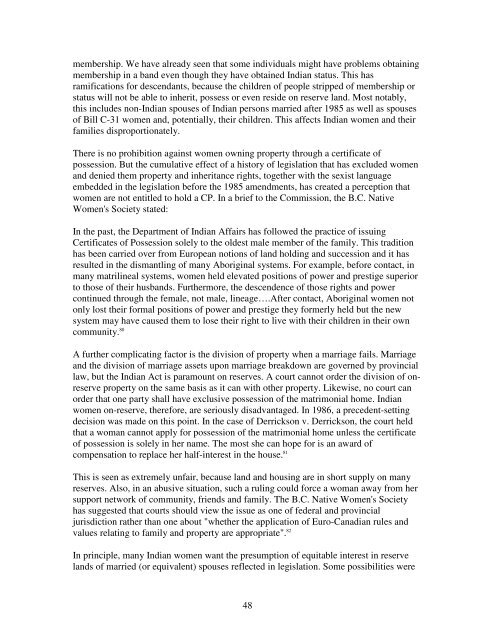2. Women's Perspectives - Christian Aboriginal Infrastructure ...
2. Women's Perspectives - Christian Aboriginal Infrastructure ...
2. Women's Perspectives - Christian Aboriginal Infrastructure ...
You also want an ePaper? Increase the reach of your titles
YUMPU automatically turns print PDFs into web optimized ePapers that Google loves.
membership. We have already seen that some individuals might have problems obtaining<br />
membership in a band even though they have obtained Indian status. This has<br />
ramifications for descendants, because the children of people stripped of membership or<br />
status will not be able to inherit, possess or even reside on reserve land. Most notably,<br />
this includes non-Indian spouses of Indian persons married after 1985 as well as spouses<br />
of Bill C-31 women and, potentially, their children. This affects Indian women and their<br />
families disproportionately.<br />
There is no prohibition against women owning property through a certificate of<br />
possession. But the cumulative effect of a history of legislation that has excluded women<br />
and denied them property and inheritance rights, together with the sexist language<br />
embedded in the legislation before the 1985 amendments, has created a perception that<br />
women are not entitled to hold a CP. In a brief to the Commission, the B.C. Native<br />
<strong>Women's</strong> Society stated:<br />
In the past, the Department of Indian Affairs has followed the practice of issuing<br />
Certificates of Possession solely to the oldest male member of the family. This tradition<br />
has been carried over from European notions of land holding and succession and it has<br />
resulted in the dismantling of many <strong>Aboriginal</strong> systems. For example, before contact, in<br />
many matrilineal systems, women held elevated positions of power and prestige superior<br />
to those of their husbands. Furthermore, the descendence of those rights and power<br />
continued through the female, not male, lineage….After contact, <strong>Aboriginal</strong> women not<br />
only lost their formal positions of power and prestige they formerly held but the new<br />
system may have caused them to lose their right to live with their children in their own<br />
community. 80<br />
A further complicating factor is the division of property when a marriage fails. Marriage<br />
and the division of marriage assets upon marriage breakdown are governed by provincial<br />
law, but the Indian Act is paramount on reserves. A court cannot order the division of onreserve<br />
property on the same basis as it can with other property. Likewise, no court can<br />
order that one party shall have exclusive possession of the matrimonial home. Indian<br />
women on-reserve, therefore, are seriously disadvantaged. In 1986, a precedent-setting<br />
decision was made on this point. In the case of Derrickson v. Derrickson, the court held<br />
that a woman cannot apply for possession of the matrimonial home unless the certificate<br />
of possession is solely in her name. The most she can hope for is an award of<br />
compensation to replace her half-interest in the house. 81<br />
This is seen as extremely unfair, because land and housing are in short supply on many<br />
reserves. Also, in an abusive situation, such a ruling could force a woman away from her<br />
support network of community, friends and family. The B.C. Native <strong>Women's</strong> Society<br />
has suggested that courts should view the issue as one of federal and provincial<br />
jurisdiction rather than one about "whether the application of Euro-Canadian rules and<br />
values relating to family and property are appropriate". 82<br />
In principle, many Indian women want the presumption of equitable interest in reserve<br />
lands of married (or equivalent) spouses reflected in legislation. Some possibilities were<br />
48
















